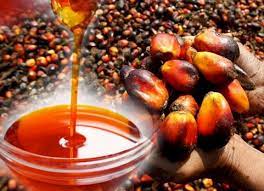Economic Importance, Uses, and By-Products of Oil Palm’s Palm Oil
Palm oil is an edible vegetable oil derived from the fruit of the oil palm tree, scientifically known as Elaeis guineensis. It is one of the most widely consumed and versatile vegetable oils globally, with a variety of applications in the food, cosmetic, and biofuel industries
The oil palm tree is native to West Africa but is now extensively cultivated in tropical regions, particularly in Southeast Asia, including countries like Indonesia and Malaysia, which are the largest producers of palm oil. The trees are highly efficient oil producers and can yield significant quantities of oil per hectare of land.
Palm oil has a distinct reddish-orange color due to its high content of natural carotenoids, such as beta-carotene, which gives it a rich appearance. It has a semi-solid consistency at room temperature but melts easily when heated. This property makes palm oil suitable for various culinary purposes, including cooking, frying, baking, and as an ingredient in processed foods.
In the food industry, palm oil is commonly used in the production of margarine, vegetable shortenings, confectionery products, and a wide range of processed foods like snacks, biscuits, and instant noodles. Its stability at high temperatures makes it desirable for frying applications, as it has a long shelf life and imparts a desirable texture and mouthfeel to food products.
Besides its culinary applications, palm oil is also used in the production of personal care and household products. It is a common ingredient in cosmetics, soaps, detergents, and candles due to its ability to provide moisture and enhance texture. Palm oil derivatives, such as palm kernel oil and palm kernel olein, are also utilized in the manufacturing of biofuels, animal feed, and as raw materials for oleochemical industries.
However, the production and consumption of palm oil have raised concerns regarding environmental sustainability and social issues. Palm oil plantations have been associated with deforestation, habitat destruction, loss of biodiversity, and greenhouse gas emissions. The expansion of oil palm cultivation has led to the displacement of indigenous communities and conflicts over land rights in some regions.
Efforts are being made to promote sustainable palm oil production through certification schemes, such as the Roundtable on Sustainable Palm Oil (RSPO), which aims to ensure the responsible and environmentally-friendly cultivation of palm oil. The industry is also exploring alternative methods and sources for sustainable vegetable oils to mitigate the environmental impact associated with palm oil production.
It is important for consumers and businesses to be aware of the environmental and social implications of palm oil production and make informed choices by supporting sustainable and certified sources of palm oil or considering alternative vegetable oils when possible.
Economic Importance, Uses, and By-Products of Oil Palm’s Palm Oil
Palm oil, derived from the fruit of the oil palm tree (Elaeis guineensis), has numerous economic importance and uses. Here are some key points explaining its significance:

1. Edible Oil: Palm oil is widely used as an edible oil in cooking and food processing. It is a versatile oil with a high smoking point, making it suitable for frying and deep-frying. It is also used in the production of margarine, spreads, and baked goods.
2. Food Industry: Palm oil is extensively used in the food industry as an ingredient in various products. It is found in items such as snacks, cookies, chocolates, ice cream, instant noodles, and condiments like mayonnaise and salad dressings.
3. Household Products: Palm oil is a common ingredient in household products such as soaps, detergents, shampoos, and cosmetics. Its inclusion in these products helps to provide texture, stability, and moisturizing properties.
4. Biofuel: Palm oil is used as a feedstock for the production of biodiesel, a renewable and environmentally friendly alternative to fossil fuels. Biodiesel made from palm oil can be blended with diesel fuel or used as a standalone fuel in diesel engines. This usage contributes to reducing greenhouse gas emissions and dependence on fossil fuels.
5. Industrial Applications: Palm oil finds application in various industrial sectors. It is used in the manufacturing of lubricants, greases, candles, and waxes. Its properties, such as high oxidative stability and viscosity, make it suitable for these applications.
6. Animal Feed: Palm kernel cake, a byproduct of palm oil extraction, is commonly used as an ingredient in animal feed formulations. It provides a good source of energy and protein for livestock, poultry, and aquaculture, contributing to the growth and development of animals.
7. Oleochemicals: Palm oil serves as a raw material for the production of oleochemicals. These chemicals are derived from natural oils and fats and find applications in various industries, including personal care products, pharmaceuticals, plastics, and lubricants.
Example: Palm oil can be refined to produce stearic acid, which is used in the manufacturing of soaps, candles, cosmetics, and detergents.
9. Employment and Income Generation: The palm oil industry is a significant source of employment and income for many countries, particularly in Southeast Asia and Africa. It provides job opportunities for millions of people involved in cultivation, harvesting, processing, and distribution of palm oil and its products.
Read Also : Economic Importance, Uses, and By-Products of Oil Palm Pollen
10. Economic Development: Palm oil cultivation and processing contribute to the economic development of producing countries. It generates foreign exchange earnings through exports and stimulates local economies by supporting infrastructure development, trade, and investment.
Example: Malaysia and Indonesia are the largest producers of palm oil, and the industry plays a crucial role in their economies.
11. Poverty Alleviation: The palm oil industry has helped alleviate poverty by providing income opportunities for smallholder farmers, who cultivate palm oil on small plots of land. By participating in the palm oil value chain, these farmers can improve their livelihoods and support their families.
12. Export Revenue: Palm oil is a major export commodity for producing countries, contributing to their foreign exchange earnings. The global demand for palm oil makes it a valuable export, allowing countries to generate revenue and improve their balance of trade.
13. Job Creation in Rural Areas: Palm oil cultivation provides employment opportunities in rural areas where alternative livelihood options may be limited. It helps to alleviate rural poverty by creating jobs and improving the standard of living for communities involved in palm oil production.
14. Cooking Oil Affordability: Palm oil’s affordability makes it an essential cooking oil for many households, particularly in developing countries. Its availability and relatively lower cost compared to other edible oils make it a crucial component in food security and nutrition.
15. Smallholder Farming Support: Palm oil cultivation often involves smallholder farmers who own or manage small plots of land. The industry provides support to these farmers through training programs, access to credit, and the provision of inputs, helping to enhance their productivity and income.
16. Byproduct Utilization: Palm oil production generates valuable byproducts that have economic uses. Palm kernel oil, extracted from the palm kernel, is used in the production of various products such as cosmetics, chocolates, and specialty fats. Additionally, palm kernel cake serves as a feed ingredient, as mentioned earlier.
Example: Palm kernel oil is used as a key ingredient in the manufacturing of soaps, creams, and lotions due to its moisturizing properties.
17. Infrastructure Development: Palm oil production often leads to the development of infrastructure in rural areas. The establishment of plantations necessitates the construction of roads, processing mills, and other facilities, which can contribute to overall regional development.
18. Economic Diversification: Palm oil cultivation provides an avenue for economic diversification in countries heavily.
It’s important to note that while palm oil has various economic uses, its production has raised concerns regarding deforestation, habitat destruction, and greenhouse gas emissions. Sustainable practices and certifications, such as those promoted by the Roundtable on Sustainable Palm Oil (RSPO), aim to address these issues and promote responsible palm oil production.
The Products and By-products That Can Be Derived From Oil Palm’s Palm Oil

Palm oil, derived from the fruit of the oil palm tree, is a versatile and widely used vegetable oil. It has numerous applications in various industries, and several products and by-products can be derived from it. Here is a list of some of the main products and by-products derived from palm oil, along with explanations, examples, and processes:
1. Refined Palm Oil: This is the primary product obtained from palm oil. It undergoes a refining process to remove impurities and enhance its quality, resulting in a clear and odorless oil suitable for various applications. Refined palm oil is used extensively in cooking and food processing, as well as in the production of margarine, shortening, and cooking fats.
2. Palm Olein: Palm olein is a liquid fraction of palm oil that is obtained through a process called fractionation. It is commonly used as a cooking oil, especially in regions where palm oil is widely available. Palm olein has a high smoke point and is resistant to oxidation, making it suitable for frying and deep-frying purposes.
3. Palm Stearin: Another fraction obtained through fractionation is palm stearin. It has a higher melting point compared to palm olein and is solid at room temperature. Palm stearin is used in the production of bakery fats, shortenings, and confectionery products. It provides desirable textural properties and stability to the final products.
Read Also : Economic Importance, Uses, and By-Products of Oil Palm Mesocarp
4. Palm Kernel Oil: Palm kernel oil is extracted from the kernel or seed of the oil palm fruit. It is widely used in the food industry for the production of various food products such as chocolates, ice creams, cookies, and pastries. Palm kernel oil is also utilized in the manufacture of cosmetics, soaps, detergents, and personal care products.
5. Palm Kernel Cake: After extracting palm kernel oil, the remaining kernel cake is a valuable by-product. It is commonly used as animal feed due to its high protein content. Palm kernel cake can be processed further to enhance its nutritional value and utilized in the production of livestock and poultry feeds.
6. Palm Kernel Expeller: Palm kernel expeller is another by-product obtained during the extraction of palm kernel oil. It is primarily used as animal feed due to its high fiber content. Palm kernel expeller is rich in energy and protein, making it suitable for inclusion in animal diets.
7. Palm Fatty Acid Distillate (PFAD): PFAD is a by-product obtained during the refining of palm oil. It is rich in free fatty acids and is commonly used in the production of soap, detergents, and oleochemicals. PFAD can also be further processed to obtain high-quality fatty acids for various industrial applications.
8. Palm Wax: Palm wax is a by-product derived from the fractionation of palm oil. It is a natural wax with a high melting point and is often used in the production of candles, polishes, and coatings.
9. Glycerin: Glycerin, also known as glycerol, is a valuable by-product obtained during the production of biodiesel from palm oil. It has numerous applications in the pharmaceutical, food, and cosmetic industries. Glycerin is used as a moisturizer, solvent, sweetener, and humectant in various products.
10. Palm-based Surfactants: Surfactants are compounds used in various industries, including personal care, household cleaning, and industrial applications. Palm oil can be processed to produce palm-based surfactants, which are used as emulsifiers, detergents, and foaming agents in products such as shampoos, soaps, and cleaning solutions.
11. Biodiesel: Palm oil is a significant feedstock for biodiesel production. Through a process called transesterification, palm oil can be converted into biodiesel, which is an alternative fuel source for diesel engines. Biodiesel derived from palm oil can help reduce greenhouse gas emissions and promote renewable energy usage.
12. Biochemicals: Palm oil can be used as a raw material for the production of various biochemicals. For example, it can be converted into fatty acids, alcohols, esters, and other compounds that find applications in industries such as pharmaceuticals, cosmetics, lubricants, and plastics.
13. Palm-based Oleochemicals: Oleochemicals are derived from natural oils and fats and find applications in various industries. Palm oil serves as a feedstock for the production of palm-based oleochemicals, including fatty acids, fatty alcohols, and glycerol derivatives. These oleochemicals are used in the manufacturing of soaps, detergents, personal care products, and industrial chemicals.
14. Palm Biomass: Palm oil production generates significant amounts of biomass, including empty fruit bunches, palm fronds, and palm trunk fibers. These biomass residues can be utilized for various purposes, such as power generation, production of biochar, composting, and as raw materials for the paper and board industry.
15. Palm-based Animal Feed Supplements: Some by-products derived from palm oil, such as palm kernel meal and palm press fiber, can be processed further to produce animal feed supplements. These supplements provide additional nutrients and dietary fiber for livestock and poultry, contributing to efficient animal nutrition.

These are some of the main products and by-products derived from palm oil. The processes involved in their production vary depending on the desired product and may include extraction, refining, fractionation, and further processing to obtain specific properties for different applications.
It’s important to note that while palm oil and its derived products have various applications, the palm oil industry has faced criticism for its environmental and social impact, including deforestation, habitat destruction, and labor issues. Sustainable practices and certifications, such as RSPO (Roundtable on Sustainable Palm Oil), aim to address these concerns and promote responsible palm oil production.
Read Also : Sheep 101: Wool Production Complete Guide









